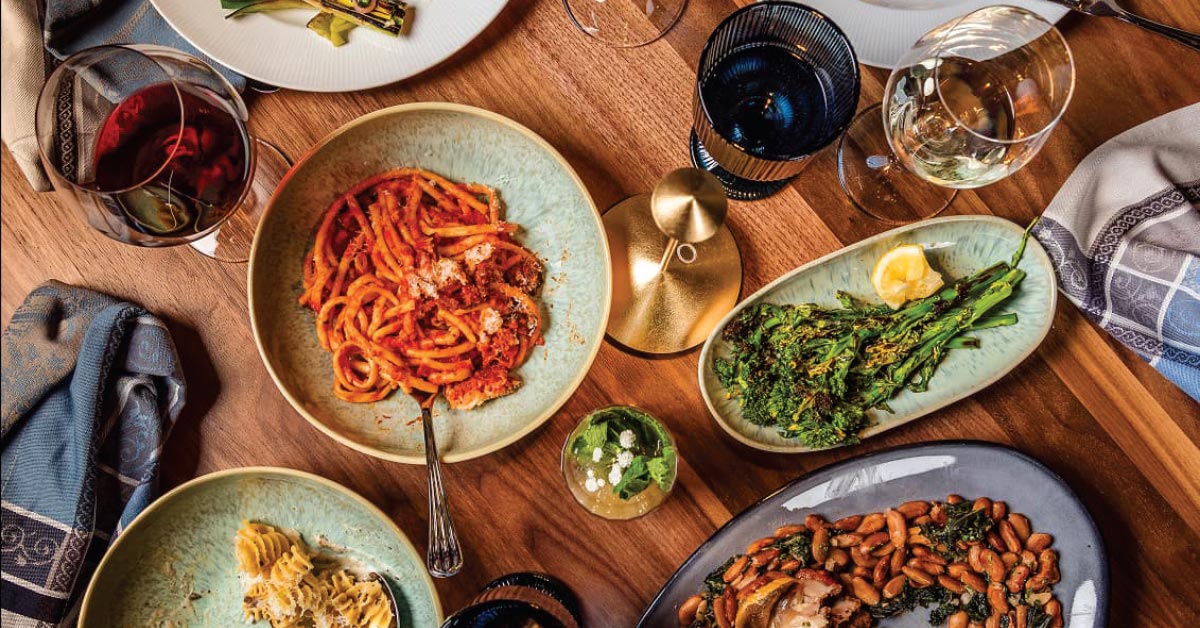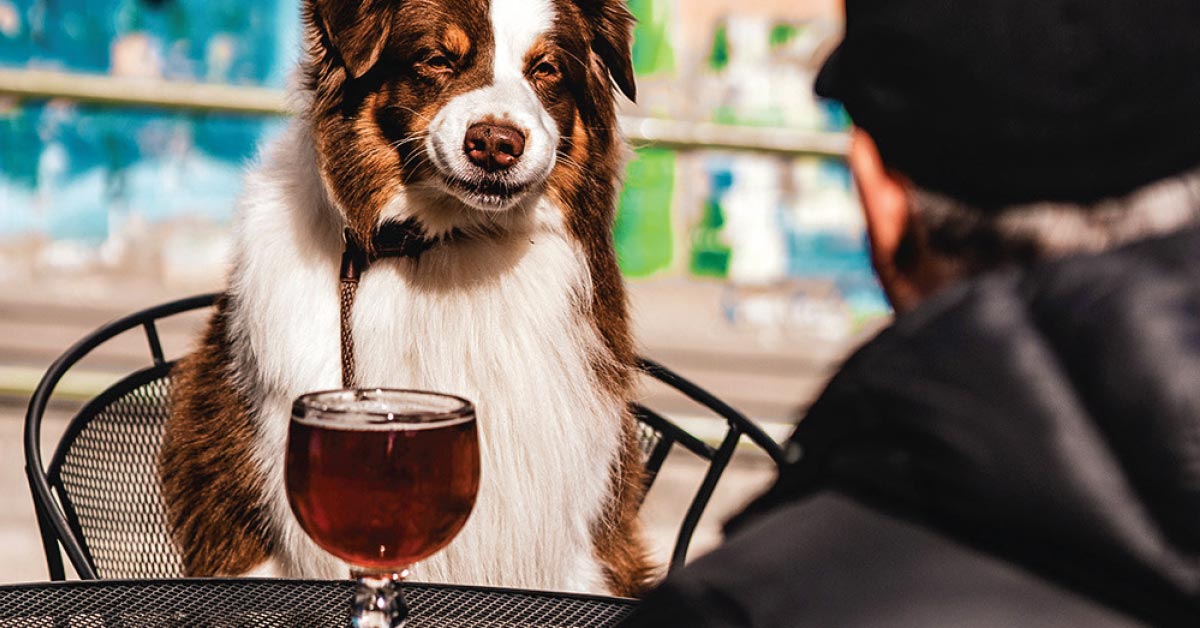What’s it really like to work in a kitchen?
It’s a question so many of us are fascinated by, as the dining experience typically puts walls between us and the people making our food. When you look at popular depictions of kitchen life, such as The Bear or even Five-Year Engagement, it seems intense to say the least.
So we wanted to talk to a real chef from one of the best local restaurant groups around: Jon Haener, culinary director of Butcher’s Union, Gin Gin’s and O’Toole’s. Here’s what he had to say.
Butcher’s is widely seen as having consistent quality for nearly a decade now. How do you maintain that?
It’s a huge team effort. First and foremost, we have an amazing team from the top down. And that starts with Dave and Paul, the two owners, and it goes down to the dishwashing team, the serving team, the chef team and the management team that we have. We put a lot of thought into every little aspect, whether it’s food, cocktail, service, ambiance. We try a lot of things in the kitchen. We’ll try something 15, 20 times before it even hits the menu. And it’s very collaborative, and we have a lot of buy-in from the team. I mean, if something is going slightly wrong, we’re all looking at it, and we’re all putting emphasis on it to make sure that we’re fixing it and getting it right back up to our standards.
What keeps everyone invested in that?
We try to instill in everyone that we want to be the best. We want to use the best ingredients, we want to teach the best techniques in the kitchen and behind the bar. I think really bringing people in who want to learn and want to grow helps everyone buy into the same vision. Experience is really good, but we look for an attitude, and we look for someone who wants to join our team, wants to grow with us.
What’s your favorite part of working in a kitchen?
For me, I grew up playing a lot of sports including hockey, and I think the kitchen is very similar to that, right? It’s a very team-oriented atmosphere and there’s high stress situations, so that’s what I was always drawn to. I’ve been in a kitchen since I was 16, on and off, starting as a dishwasher. It’s the same thing as like, end of the game, there’s two minutes left, you’re down a goal, you got to get everyone routed around you to push through and get that goal in. It’s a very fast-paced environment and every day is slightly different, which I enjoy, and you’re always moving.
For those of us who’ve only seen inside fictional kitchens, how much yelling is there really?
I would say it depends where you go, but there isn’t any in our kitchens. I mean, I’ve been a part of yelling kitchens for sure, growing up. That’s how some people were brought up, right? But I moved to Chicago and worked for a group called One Off Hospitality, with chef owner Paul Kahan, and I never once heard him yell. I was like, “This is how it should be.” I mean, he could get mad, but he was always very calm, cool, collected, and he got his point across in a really respectful way. That was like, “Okay, this is how I want to run kitchens.” We like to motivate by encouraging a challenge. We want to create a place where people want to come to work every day. It's not fun going into work being like, “Oh no. What is chef gonna do today?”
What’s your biggest kitchen disaster?
I was working at a hotel in Chicago, we had our first banquet event, and I was using a new piece of equipment. Everyone in the company was there—the owners, our culinary director, the chef—all there helping. I went to cut into the chickens, three minutes away from plating, serving about 200 people, and every chicken was raw.
I’m 23 at the time, and I just want to curl up in a hole and start crying. I have all these people looking at me ready to go. I said to my boss, “Hey Chef, these chickens aren’t even close to being cooked.” He looked at me and goes, “Okay, well, let’s turn some ovens up. You put them in, and I’ll go figure the rest out.” Fifteen minutes later, no one knew any different, the chickens were cooked. Everyone rallied together and helped me pull it out. And then, afterwards, my chef just goes, “Hey, man, today’s a really good learning experience. But that’s why all of us were up there. That’s what we do as a company.”
What are some of the most important ingredients in your kitchen?
We do a lot of research. And I think the way we look at food or drink is, we try to get the best possible product, whether that's us making it, like pastas, every day, or bread, we make all the focaccia at butcher's union, and then we make our rolls at Gin Gin’s. So, there isn't necessarily one important ingredient, but we spend a lot of time sourcing every little piece, from the flour—if we don't have a great flour, the bread and pasta is not going to be the best that it can be. So first and foremost, we try to make everything in-house. But we try to find really great base ingredients. That goes all the way to the fish and the steaks. So, we try to find a great beef program that is number sustainable, that treats its animals and land right, that gives back so it's not just pulling, pulling, pulling, but that we can use, right?
So, like, Snake River is a very good example out of Idaho. The way they treat their cattle and the farms the cattle live on is of extreme high quality, and they take a lot of respect and pride in raising those cattle, and that's what we love so much about it. And it shows. Their beef is incredible, right? And that goes across the board. We try to use as many farms in Michigan as we can. Me and the chef team are at the farmers market at least twice a week, once they open for summer hours. Then we talk with everyone, and we try to find the best tomatoes that we can buy, or if we can get herbs from Visser, we're going to try to get that, as long as they can keep up with us. Before anything goes on the menu, there is a lot of leg work to be done just to make sure that we are getting the best possible thing.
Do you have a favorite kitchen tool?
Do you know what a cake tester is? In a lot of photos of chefs and things like that, you’ll see this little blue thing popping up in their aprons. That’s one of my favorite tools. You can use it for a lot of various things. Obviously, for checking cakes, that’s how it originated. Stick it in, pull it out, if it’s clean, the cake is done. But everyone on our team uses these for everything from checking a braise to see if it’s fork tender, to checking the temperature of a piece of fish or steak. If you stick it into a piece of steak for a couple seconds and put it on the inside of your wrist, you’ll be able to feel if it’s warm, if it’s cold, if it’s hot. And that’s kind of the first step that we use to see how things are cooked. It has a million uses that not a lot of people know about. They’re incredibly valuable, and they cost like, 15 cents.
What do you like to cook at home for yourself and your family?
This is probably my favorite question. We make pizza and pasta at our house all the time. We have an Ooni pizza oven in our backyard. And I have a four-year-old son, who’s obviously been around the restaurant a lot, and he really likes cooking. So, for him, making pasta, making pizza dough, it’s kind of like playing with Play-Doh, but then you get to eat it. So that’s a lot of fun for us. I mean, pizza can be very simple, but when you make it, my soul feels good afterwards. It’s nothing fussy, nothing pretentious, but you know it’s good. And you can make pizza dough in five minutes, let it sit for an hour or so, and then you can make the pizza. It’s things like that, that are pretty simple, but it gets everybody involved.
I gravitate towards Italian cooking a lot, because I love the tradition of it. On Instagram, there's something called the Pasta Grannies, and it’s one of the coolest things. It's just these little old ladies who are making pasta for years and years, and they still enjoy doing it every single day, and it's fun. So yeah, I mean, my two nephews will come over, my son and I will make pasta, and we do it pretty regularly. I mean, we'll eat and make pizza at least once a week, if not twice. And same thing with pasta, we'll do it at least once a week, that we make from scratch.
How do you really feel about someone coming in 10 minutes before the kitchen closes?
We like that! We want people to come in late. We talk about this a lot in our meetings—if we have a full rail at close, that’s cool. That’s awesome. We want to be busy up to the very end. And I mean, if someone walks in whatever, 10:45, 10:50, we’re closing at 11? Cool. We’re doing last call, but you can sit down and get a full meal still. We want someone who walks in at 4pm, at 6:30, at 10:45, all to get the same experience





